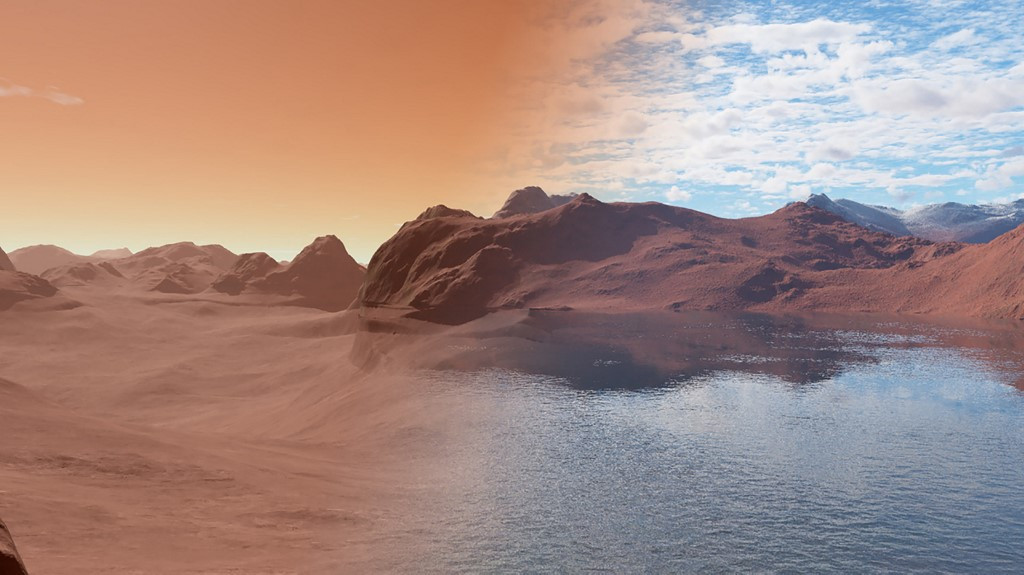Popular Reads
Top Results
Can't find what you're looking for?
View all search resultsPopular Reads
Top Results
Can't find what you're looking for?
View all search resultsMars once had wet-dry climate conducive to supporting life: study
Though the surface of Mars is now an arid desert, billions of years ago rivers and vast lakes are thought to have stretched across its surface.
Change text size
Gift Premium Articles
to Anyone
 This handout picture released on December 19, 2017 by Nature Communication shows Mars through time : Current Mars, red, dead and dry on the left, in contrast with the same landscape covered in water, early in the planet's history, over 3 billion years ago. An explanation for why water disappeared from the surface of Mars shortly after its formation, but remained present on Earth, producing conditions suitable for the evolution of life, is published in this week’s Nature. The study suggests that basalts on Mars can hold more water than those on Earth, and that some of the water on Mars may be buried underground.
(Agence France Presse/Jon WADE, James MOORE / NATURE PUBLISHING GROUP )
This handout picture released on December 19, 2017 by Nature Communication shows Mars through time : Current Mars, red, dead and dry on the left, in contrast with the same landscape covered in water, early in the planet's history, over 3 billion years ago. An explanation for why water disappeared from the surface of Mars shortly after its formation, but remained present on Earth, producing conditions suitable for the evolution of life, is published in this week’s Nature. The study suggests that basalts on Mars can hold more water than those on Earth, and that some of the water on Mars may be buried underground.
(Agence France Presse/Jon WADE, James MOORE / NATURE PUBLISHING GROUP )
N
ASA's Curiosity rover has discovered the first evidence that Mars once had a climate which alternated between wet and dry seasons similar to Earth, a study said on Wednesday, suggesting the red planet may have once had the right conditions to support life.
Though the surface of Mars is now an arid desert, billions of years ago rivers and vast lakes are thought to have stretched across its surface.
Since 2012, the Curiosity rover has been exploring the huge Gale crater, which is believed to be home of a former lake and has a massive mountain of sediment nearly six kilometres (four miles) high in its centre.
"We quickly realised that we were working in lakes and rivers deposits, but did not know what type of climate they were linked to," William Rapin, a researcher at France's CNRS scientific research centre and the study's lead author, told AFP.
While climbing the slope of the sediment mountain in 2021, Curiosity found salt deposits forming a hexagonal pattern in soil dated to nearly four billion years ago.
The rover's instruments identified the patterns as cracks in dried mud, according to the study published in the journal Nature.
"When a lake dries up the mud cracks, and when it fills back up, the cracks heal," Rapin explained.
Repeat this process enough times, and the cracks arrange themselves in hexagons.
Therefore, this is "the first tangible proof that Mars had a cyclical climate," Rapin said.
Regularly occurring wet and dry seasons, as on Earth, could have provided the conditions needed for life to form, the researchers said.
'Pretty lucky'
Curiosity has already detected the presence of organic compounds considered the building blocks of life on Mars, which could be another piece of the puzzle.
But these building blocks need the right conditions to become the precursors of life.
"In a world that's too dry, these molecules never have the opportunity to form -- nor do they in a world that's too wet," Rapin said.
But banish thoughts of big-headed green men -- if Mars did support life, it was likely primitive single-celled microorganisms.
"Over 11 years, we've found ample evidence that ancient Mars could have supported microbial life" due to the Curiosity rover, said Ashwin Vasavada of NASA's Jet Propulsion Laboratory.
"Now, the mission has found evidence of conditions that may have promoted the origin of life, too," he said in a statement.
The discovery of such ancient terrain could never have been possible on Earth, where tectonic plates constantly reshuffle the surface, sifting away such lingering traces of the past.
That means that studying Mars -- which lacks tectonic plates -- could help scientists solve the mystery of how life began on our home planet.
"It's pretty lucky of us to have a planet like Mars nearby that still holds a memory of the natural processes which may have led to life," Rapin said.










